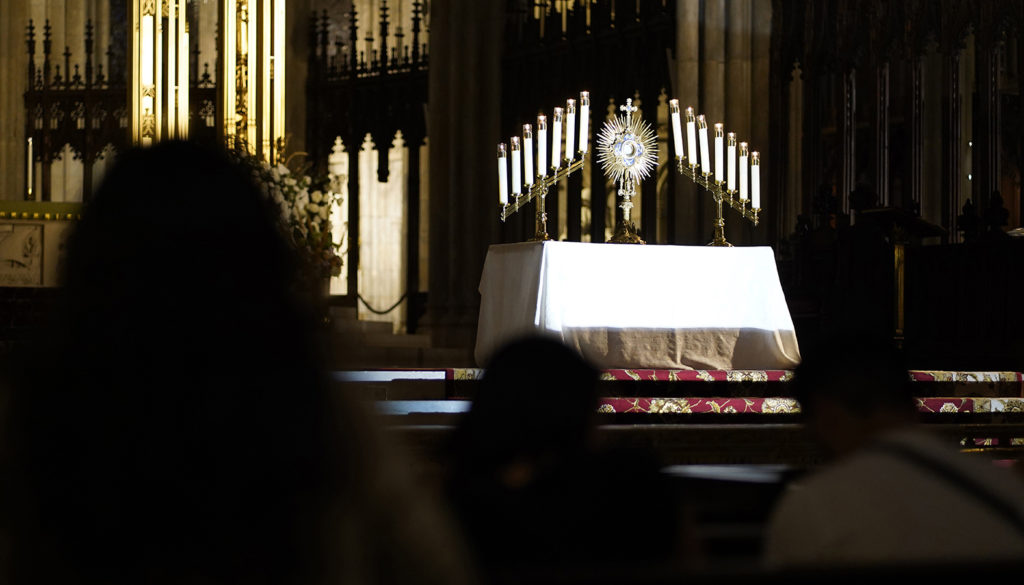I’ve been for several weeks in Ireland’s County Galway, “enjoying” some of the worst summer weather in living memory. When even the Irish acknowledge the gloom, you know you’re in trouble.
One bright spot has been the Church of the Immaculate Conception, a huge stone structure with ornamental battlements that towers over the village of Oughterard.
Adoration is held after 10 a.m. Mass Tuesdays and Fridays. That first Tuesday, Father Michael guided us into the Lamb of God Chapel, led the Divine Praises, and dimmed the lights.
I looked around at the seven or eight other oldish women — there were no men that day — and thought of the plodding, steady devotion of the women who come to church all over the world, day in, day out, week in, week out; who attend daily Mass, say the rosary, pray the novenas, grip the holy cards, wear the scapulars. Who carry the flame. Who wait. And who in a very real way have kept the Church going.
I thought of Carlo Carretto (1910-1988), an Italian priest who burned his address book and set out for the Sahara to follow in the steps of St. Charles de Foucauld. Murdered by the Tuareg he’d longed to convert, Foucauld had been found dead in the sand, inches away from the monstrance.
Carretto wrote a book about his time in the Sahara: “Letters from the Desert.” I’d gone back to it many times, and found a copy in the house where I was staying.
He describes a whole week he spent alone with the Eucharist, exposed day and night.
“Silence in the desert, silence in the cave, silence in the Eucharist. No prayer is so difficult as the adoration of the Eucharist. One’s whole natural strength rebels against it.
One would prefer to carry stones in the sun. The senses, memory, imagination, all are repressed. Faith alone triumphs and faith is hard, dark, stark.”
In a chapter called “The God of the Impossible,” he writes of a time later in his stay, again sitting in adoration one blazing hot morning. He’d been injured while working alongside the local laborers.
“My leg was hurting terribly, and I had to work up the force to stop my mind from wandering. I remembered Pius XII once asking in one of his audiences, ‘What does Jesus do in the Eucharist?’ and he awaited the reply from his students. Even today, after so many years, I do not know how to reply.
What does Jesus do in the Eucharist? I have thought about it often.
In the Eucharist Jesus is immobilized not in one leg only, but both, and in his hands as well. He is reduced to a little piece of white bread. The world needs him so much and yet he doesn’t speak.
Men need him so much and he doesn’t move!
The Eucharist is the silence of God, the weakness of God.”
How grateful I was to be there, surrounded by fellow members of the Mystical Body. The YouTube influence/meditation gurus had nothing on these outwardly perfectly ordinary women who sat in total silence, barely moving a muscle.
Meditation in secular culture tends toward “wellness”: mental and spiritual health; excellence. Those who sit in adoration, by contrast, wouldn’t dream of trying to market what they do. No one is trying to perfect or pass on a technique, or hold themselves out as experts, or offer a certain kind of experience.
Anyone who regularly sits before the monstrance in silence knows that prayer arises from total poverty. That to pray is to be overshadowed by mystery. That prayer, grounded in Christ, is grace.
Nowhere is the scandal of the cross more apparent than in adoration. No election is won. No wounds are bandaged. No garden is tended, no child is comforted, no prisoner is visited.
“It is love that gives things their value. It makes sense of the difficulty of spending hours and hours on one’s knees praying while so many men need looking after in the world, and in the context of love we must view our inability to change the world, to wipe out evil and suffering…
It is love which must determine man’s actions, love which must give unity to what is divided.
Love is the synthesis of contemplation and action, the meeting point between heaven and earth, between God and man.”
With a gentle rain falling outside, I began to catch my breath from the long journey. A hundred dilemmas passed through my mind. Was I a “pilgrim,” as I liked to tell myself, or an unstable crank? Why, after so much prayer, was I still so judgmental, petty, and envious? What would become of me if I started to lose my memory?
I thanked Our Lord, over and over. I asked him to shore me up, one day at a time. And then I fell asleep.

